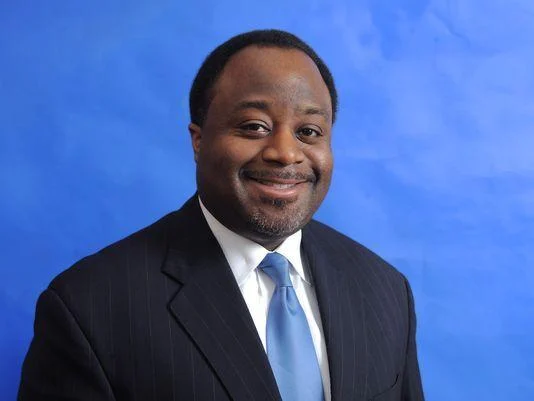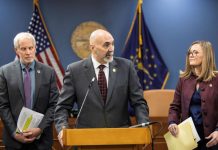Shabazz v. Rokita Lawsuit Could Hold Long-Term Implications For Journalists
- Story by Isaac Gleitz, TheStatehouseFile.com
INDIANAPOLIS—The maneuvering continues in the federal lawsuit between Attorney General Todd Rokita and journalist Abdul-Hakim Shabazz that a First Amendment expert says could hold significant implications for how the press covers public officials.
The lawsuit—Shabazz v. Rokita—stems from an October incident in which staff in Rokita’s office barred Shabazz, an attorney, and publisher of IndyPolitics.Org, from attending a press conference about another unrelated lawsuit that Rokita was filing. Earlier this month, Rokita filed a motion to dismiss the lawsuit, but the case still stands for now.
The American Civil Liberties Union of Indiana is suing on behalf of Shabazz in the United States District Court, specifically the Southern District of Indiana, alleging that his First Amendment rights were violated. The First Amendment guarantees Americans’ right to freedom of speech and freedom of the press, among other assurances.
The lawsuit calls for an injunction that would grant Shabazz access to future events in the attorney general’s office.
Shabazz was denied access to the event for not having media credentials, although Shabazz showed a staff member his press badge issued by the Indiana Department of Administration. He didn’t know it at the time, but one of Rokita’s spokespeople had sent him an email when he was on his way to the conference with the following message: “Hi Abdul, [w]e’re sorry, but you are not credentialed for this event. Please watch via Livestream. Best, David A. Keltz.â€
In court documents, Shabazz claims he didn’t get the email until after he’d already approached the main conference room of the AG’s office.
Soon after Shabazz filed the lawsuit, The Indianapolis Star emailed Rokita’s office to ask why Shabazz was denied access. The office responded by saying it was because he is a gossip columnist.
“Our press conferences are meant for actual journalists reporting on real issues,†the response read.
Striving to dispel the attorney general’s reasoning, the lawsuit explains that Shabazz writes much more than “gossip columns.†He’s been in the political arena for nearly two decades. In addition to his job at IndyPolitics.Org, he hosts a weekly show on WIBC radio called “Abdul at Large†and writes freelance columns for TheStatehouseFile.com, the Indianapolis Business Journal, and other outlets.
The lawsuit alleges that Shabazz was turned away because Rokita perceives him as too liberal and because Rokita doesn’t like him. The two have a history of feuding.
Shabazz and Rokita appear to have been on good terms until a Republican primary debate of Rokita’s failed campaign for U.S. Senate in 2018. According to the lawsuit, Rokita objected when he learned that Shabazz was moderating the discussion, calling him biased and liberal. Shabazz moderated the debate nonetheless, and U.S. Sen. Mike Braun, R-Indiana, won the race. Now, some of that tension might be resurfacing as the lawsuit progresses.
Rokita Motion To Dismiss
Abdul-Hakim Shabazz.
On March 2, Rokita’s office filed a motion to dismiss the lawsuit, claiming there was no First Amendment violation.
“The First Amendment does not grant Plaintiff a right to hear a government official deliver a message in person, as opposed to through a Livestream,†the motion read.
The motion also said there is no First Amendment right to hear from a government official at a press conference and added that a federal court has never mandated that a government official take questions from a particular journalist.
The motion also denied the plaintiff’s claim that relief is needed because it holds there is no “concrete threat of future action,†adding that no illegal activity took place.
A press release from the attorney general the next day said any journalist could have attended the event’s Facebook Livestream and posted his or her questions in the comments section. The release never mentioned Shabazz’s name, but Rokita used it as a way to explain his viewpoint on the case. Rokita’s press secretary, Kelly Stevenson, told TheStatehouseFile.com that he “isn’t available for an interview†about this story.
“The ACLU is trying to make a federal case over a bruised ego,†Rokita said in the release. “It should not waste the court’s time or taxpayers’ resources. We remain focused on doing the important work the good people of Indiana have elected us to do.â€
The release also said Rokita is accessible to the media, having participated in over 150 interviews since assuming his position 14 months ago.
“My accessibility to the media, as well as my record of transparency, are well-known to anyone who has followed my career,†Rokita said. “Journalists have never complained—because they have no reason to complain—about not having access to or information from my office. If anything, their complaint has been that my office provides too much information.â€
ACLU’s Response
Last week, the ACLU responded to Rokita’s motion to dismiss with a motion of its own. Right off the bat, the lawyers referenced John K. MacIver Institute for Public Policy, Inc. v. Evers, which it said sets the precedent for cases of this nature.
In a previous interview with TheStatehouseFile.com, Kenneth Falk, legal director of the ACLU of Indiana and one of the lawyers representing Shabazz, said the case deserves attention.
“The idea of excluding members of the press because of disagreements with them, either personally or what have you, is concerning,†Falk said. “We depend on a free and independent press for information.â€
The judges on the John K. MacIver Institute for Public Policy, Inc. v. Evers case determined that press conferences are limited-access events because people are not welcome to walk in off the street. Because they happen in closed rooms and require credentials, they have been deemed a non-public forum under the law.
Public forums are places where anyone can show up and say whatever they want, like a curbside rally or a convention held in a public park. The judges decided that access can be limited in non-public forums if the restrictions are a “viewpoint neutral and reasonable.†However, the ACLU holds that the attorney general’s decision meets neither of these provisions.
The ACLU’s motion cited the fact that the room was large enough to hold anyone who wanted to attend the event and further alleged that even if he had known about the livestream option, he wouldn’t have been able to ask questions very well on Facebook.
After sending an email to the attorney general’s office asking how it determined who and who isn’t credentialed to attend press conferences and getting no response, Shabazz filed a request under the Indiana Access to Public Records Act to view the information. The office denied his request and said he can obtain the documents through the discovery process of his lawsuit instead, Shabazz said.
According to the ACLU’s motion, Shabazz is still barred from the attorney general’s press events, which harms his ability to report for Hoosier audiences.
The overall message of the motion is that Rokita’s dismissal should be “denied in its entirety.â€
Shabazz’s Thoughts
Shabazz told TheStatehouseFile.com the vast majority of people he talks to support his lawsuit.
“A lot of people have an issue with a government official banning the media from their event,†Shabazz said. “I never knew I had so many friends in that building [the Statehouse].â€
Shabazz said he is confident in the ACLU’s arguments and thinks the court could reasonably reach a verdict by the end of the year. He said the case will set a precedent for the government’s relationship with the press.
“You have to be a pretty ballsy individual to ban the media from your stuff. Now, there’s nothing that says that you have to have a news conference or that you have to even talk to us, but once you open that door, then you’ve got to take everything that comes along with it,†Shabazz said.
Impact On JournalismÂ
Steve Key, executive director of the Hoosier State Press Association, said the verdict in this suit will impact how journalists can cover government officials.
“If the attorney general prevailed, it would embolden and open the door for elected officials to basically try to exclude reporters that ask tough questions or seem to be more intent on holding officials accountable than the other reporters,†Key said.
If Shabazz wins, it will set a precedent that any journalist with media credentials can attend a semi-private conference, he continued.
Key said Rokita’s motion for dismissal will likely not be granted because the law favors the defendant and his or her right to have their case heard.
Rokita and Shabazz are both using the First Amendment, Key explained, but in different ways. He said Rokita is trying to express the fact that individuals have a right to speak as well as a right not to speak. Government officials don’t have to hold press conferences, he said, and they don’t have to take questions from every journalist.
However, Key said offering a Livestream option does not necessarily protect the office because Shabazz missed out on the informal interactions that journalists get to see before and after meetings. He also missed out on seeing people’s reactions live, he continued.
“Watching something from a Livestream is not the same as being in the room,†Key said. “If you’re watching it on Facebook, then you are only able to see what is on the screen.â€
Key said this case is revealing of the modern press culture because it’s becoming more difficult to determine who is and isn’t a journalist. It used to be easy, he said, because journalists worked for a print publication and only well-recognized outlets had a printing press and corresponding resources. But times have changed.
“With the internet, anybody can create a webpage or a Twitter feed. There’s not nearly the same barrier to get into the business of being part of the media. So, the question is, what is a journalist and how do you define that?”
FOOTNOTE: Isaac Gleist is a reporter for TheStatehouseFile.com, a news website powered by Franklin College journalism students.






A heck of a long column for such a simple matter. Since when does Rokita get to decide what a journalist is or isn’t? No doubt this will be settled in Shabazz’ favor as a clear violation of his First Amendment rights, also sounds like Rokita is applying Prior Restraint. This will, however, cost the taxpayers of Indiana a bunch of money that the court costs and attorney fees will swallow up. Not a good Attorney General for Indiana.
Comments are closed.